How to treat lab mice - My experience

pixabay.com
You might have noticed that there was no post from me yesterday. That’s partly due to the fact that I’m having a guest over for the weekend, partly because I had an exam in the morning and mostly because I attended a so-called “mouse course”.
In this course, I learned most things (there is a second one I still have to attend) about how to treat mice that are being used as lab animals.
I’m a Biologist. I will hopefully be a researcher in the future and there is always the possibility that I’ll have to work with animals. Do I like it? Hell no! But I think it’s necessary. And if I don’t work with them, there might be someone who doesn’t care about their welfare working with them.
Not everyone is allowed to just handle and kill animals. In the EU it’s technically even illegal to kill mice you find at home. Only a properly certified person has the right to do that.
With all that being said, I wanted to share my experience with that course to maybe give you some insight on how animals for experiments are handled and how I feel about the whole thing.
If you are very sensitive and can’t stand the descriptions of animals being harmed and/or killed, I advise against reading this. There won’t be any graphic pictures but the descriptions might be upsetting. @suesa
The course, officially 2 courses with the names “handling, fixating, marking and sex determination of mice” and “application methods and killing mice according to the animal protection laws”, started out with each of us being placed in front of a plastic cage with our own mouse in it.
Mine was a white one, curious and relaxed as this breed often is.
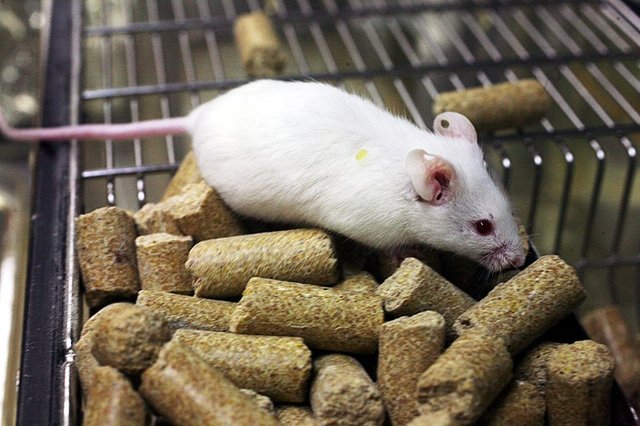
By Rama 1
My neighbor didn’t have such luck, her significantly smaller mouse had fur like a wild one and behaved a lot like it. Afraid, skittish and not at all happy about being in this room. I couldn’t blame her.
Having handled mice before, I switched with my neighbor, knowing that she might be better off with a calmer mouse. The first task was to get familiar with the animal, get it to sit on your hand and then determine its sex.
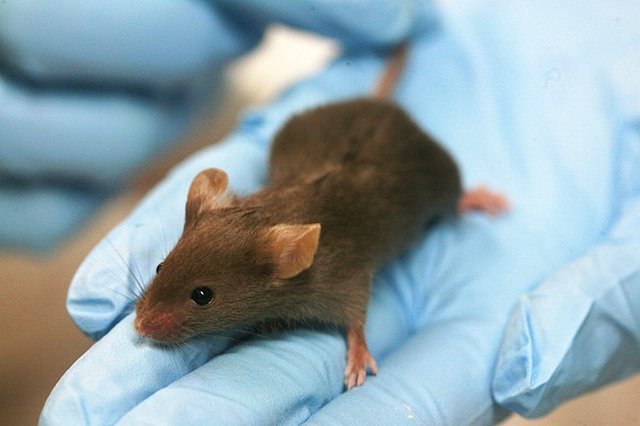
By Rama 2
I had a female and after I put some effort into it, she let me touch and weigh her without jumping out of the scale bowl. 23g.
Next, we had to fixate them. You grab the mouse, who is sitting on something she can hold on to, by the tail and then pinch the neck fur/skin to keep it from moving. It’s hard to describe, I couldn’t take a picture and I can’t find one free for use. But I guess it should be fine if I link you to one. In the picture, the person holding the mouse is already injecting something, I will explain that later.
The fixating is a lot easier with rats as they are a lot more relaxed. If they’re used to it you can just grab them below their arms, inject something and put them back. They don’t really care that much.
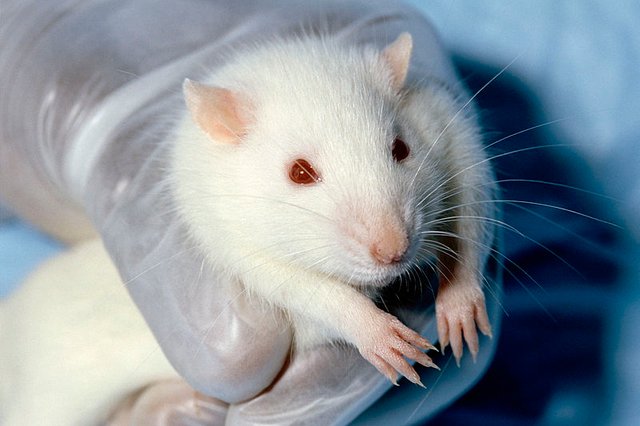
By Janet Stephens 3
Having mastered the fixation technique, I was supposed to mark the mouse. That is either done by punching a hole into the ear (the piece of skin can then be used to determine which genes the mouse carries) or attaching a metal tag to the ear. My mouse accepted both with minimal resistance, but I still felt bad.
Then I heard terrified squeaks from across the room. Someone obviously failed to keep it as painless as possible. I looked at my mouse and promised to progress as careful as possible.
I had to start practicing injecting stuff. There are several methods:
- Below the skin
Either in the “neck skin” that’s scrunched together when you hold the mouse or at the side, somewhere above the hind legs. - Into the abdomen (shown in the picture I linked)
The best way is to hold the animal with the head down so that the inner organs don’t put pressure on the injection site. Then you just need to take care to not hit the bladder. - In a vain in the tail
The last one was a bit more complicated. The mouse has to be restrained in a plastic tube with only the tail hanging out which then has to be put into warm water so that the blood vessels widen. And then you need to hit the vain.
I tried. I really tried. I failed four times before I finally injected the NaCl solution (harmless for the animal, you’re given that stuff at the hospital to prevent dehydration) in the vain instead of the surrounding tissue.
I gave my mouse a break after that. Looking at her in that cage broke my heart. I didn’t want to hurt her. I wished that animal experiments were obsolete. I still wish that. But especially for genetic research, we can’t go without them. Not yet anyway, I hope in the near future it’s possible.
The last application method was an oral application. There are several things mice won’t eat because they taste horrible. While voles love alcohol, mice often rather die than drink it. So if you want to test a drug that needs to go through the digestion tract, you need to give it to them through some kind of feeding tube.
I’ll spare you the details, it wasn’t pleasant for either of us but in the end, I succeeded. Which left me with two tasks.
Killing my mouse (with a legal method of my choice) and killing a narcotized mouse (by breaking the neck).
The method I chose for my mouse was the fastest and least painful I was able to perform. An overdose of an anesthetic and she finally got rid of me.
Breaking the neck of the other mouse was … a lot less pleasant.
You see, you have to do it right or you just break its spine. That’s why we were supposed to practice on narcotized mice. The law states that the killing process has to be as painless as possible. But sometimes you might need to kill a mouse quickly because you might have fucked up in a way. Maybe you tried to give it a drug through a feeding tube but managed to squirt it into the lung instead.
You don’t want that poor thing to suffocate, do you? So you need to break its neck. And the feeling is horrible.
The crunching noise.
How it feels when you check if you really broke the neck. That soft, wobbly, wrong feeling.
The course ended with that. After three hours, I was deemed qualified enough to do most things associated with laboratory mice. But I think there is one thing they’re teaching that might not be so obvious: compassion for the animal.
”Keep pain to an absolute minimum.”
”Reduce animal experiments whenever possible.”
”Watch the mice. If they are in pain, see if you can stop.”
”Keep pain to an absolute minimum.”
Sources: My own experience.
Picture credit:
- By Rama (Own work) [CeCILL (http://www.cecill.info/licences/Licence_CeCILL_V2-en.html) or CC BY-SA 2.0 fr (https://creativecommons.org/licenses/by-sa/2.0/fr/deed.en)], via Wikimedia Commons
- By Rama (Own work) [CeCILL (http://www.cecill.info/licences/Licence_CeCILL_V2-en.html) or CC BY-SA 2.0 fr (https://creativecommons.org/licenses/by-sa/2.0/fr/deed.en)], via Wikimedia Commons
- By Janet Stephens (photographer) [Public domain], via Wikimedia Commons
Today’s Suesa’s favorite is: @ertwro
High-quality science from a medical doctor. Looking for a variety of interesting topics? How about origami - but with proteins? Or the genetics of anti-aging? Whatever you choose, you won’t get bored!
This is getting long today …
6 people applied to be mentored by me, 4 for science, 2 for fiction! One of them, @yahialababidi is already a published author so I’ll choose to mentor the other 5 first, as I think they need more support. But you’re all invited to have a look at his profile anyway!
@booster916 , @arrjey , @melanie00 , @gentleshaid and @xhodan will be my mentees - in that order. I don’t know when the slots for the last four will be (I will message them about that and announce the beginning of it at the bottom of a post). @booster916 will be my mentee starting this Monday, until the Sunday that follows. I’m looking forward to working with all 5 of you!
Got a scientific topic which you want to see as a story? Leave me a comment!
You want to support scientists on Steemit? You are a scientist on Steemit? Join the #steemSTEM channel on steemit.chat and connect with us!
STEM is an acronym for Science, Technology, Engineering and Math
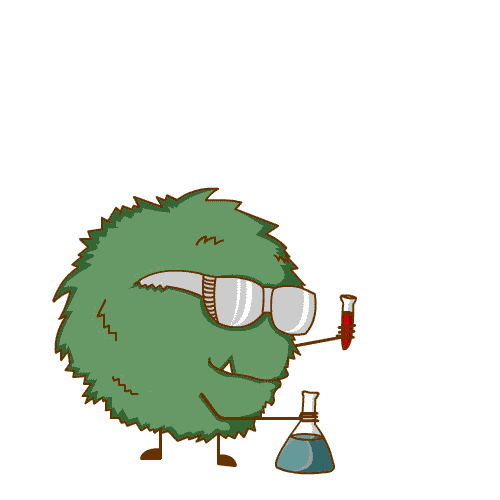
I probably could not do that. It is interesting to note that we live on a homestead and harvesting animals for food is a way of life.
But killing something up close and personal is horrible, even for me.
I hunt and fish for food and we raise chickens for meat. It is hard every single time.
We value our pets all that much more for it though, I think.
I respect the job you have taken on. It is tough but important.
Thank you.
This was really hard to read, but I understand that we wouldn't have many of the miracle cures we have to this day without testing on animals. I love all animals, but I eat meat. My dad was a butcher so I grew up around carcasses as we had our own butcher's shop. it never bothered me until I got older and understood that they were live animals once. I still eat meat, but I buy from locally produced sources and try to make sure I buy from ethical sources, especially chicken and eggs. I get those from our local farmer. It must be hard when you have compassion for animals to work in your environment, but I am grateful that there are people like you doing it for the sake of minimizing suffering. Hats off to you, I couldn't do it.
Nobody ever tells you when your a kid that if you want to become a biologist, you have to do some messed up stuff.
Worse, although I also know that these experiments with animals are probably necessary in order to achieve something in the future, tears come to me when I read something like this.
I love animals and I am so sorry for the small helpless creatures, they are helplessly at the mercy of humans.
It certainly needs people who do this work, but for me it is very sad that I would never be able to do this "work".
Thank you for this report, I think it is important that we are made aware of what we owe to the animals and how we deal with them, which brings me personally to think again what is really important in life.
I guess I never thought about the fact that there would be a course in lab animal handling, but I'm glad there is. I also like the pragmatic focus of avoiding animal experimentation in the first place, and reducing harm as much as possible.
Is this really true? Here in New England our old houses are invaded by mice all the time, and they're a key vector in the transmission of Lyme disease. If we couldn't set our old-fashioned mousetraps we'd be overrun in a hurry.
And then there's the rats in Boston. We paid good money for an apartment in a nice neighborhood, but even then we had to keep huge rat-traps on hand for occasional infestations. I quickly learned that the back-breaking snap style traps were a lot more humane than the glue traps, which leave you with a struggling, biting rat you have to kill yourself. And those guys were over a foot long.
It's at least wjat we've been told. But nobody goes around and checks, not in private homes.
Oh, that makes sense. I suppose if a large-scale extermination were necessary for public health reasons, you'd want someone certified to do it.
I worked in a mouse lab briefly and the prospect of killing them gave me the heebie jeebies. Fortunately, I haven't had to work with any animals larger than a fruit fly since. Too bad that model animals like mice really are critical to scientific progress.
I have euthansied one mouse before and it was horrific so I can’t imagine what you have to go through for research. I have been present for many euthansia’s I’ll never forget my first one which was a wallaby that had a condition called lumpy jaw. He was sedated first then after trying to find a large vein for a while the vet finally put him to rest, completely heartbreaking. At least if the experiment goes wrong you can put the animal out of pain as quickly as possible. Thanks for sharing an insight to your life :)
Puh...this was hard stuff to read, @suesa. You have my respect - I would never be able to do that.
I also work with laboratory animals. Basically, these are rabbits, mice and guinea pigs. The question of euthanasia is very difficult. But for a science it is necessary. I subscribe to you and wait for new posts on this topic
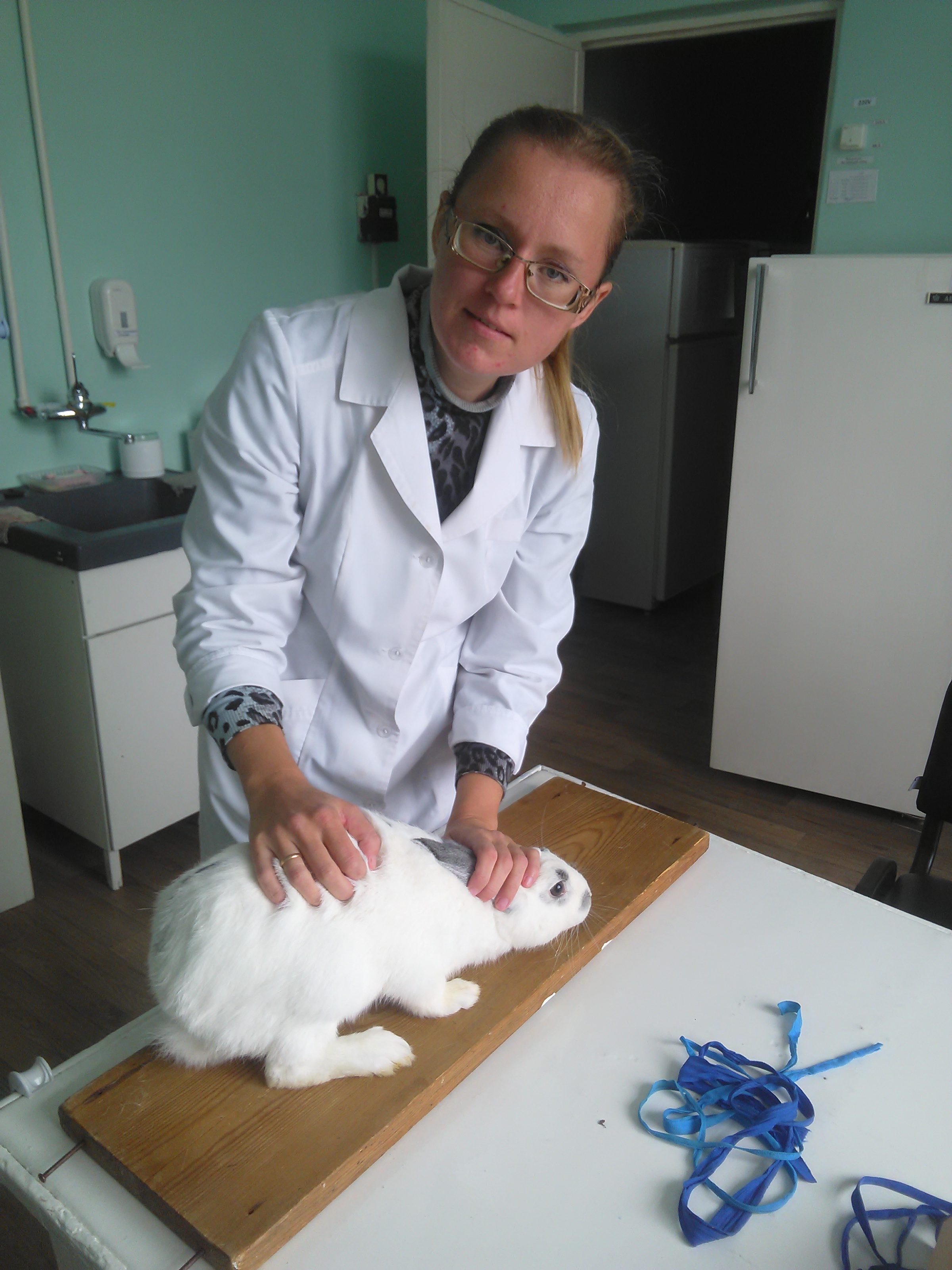
It is too hard to work with laboratory animals. I work too, but it is necessary for sicence. I will post my studies experiences too. Good luck.
Science should always be focused on the benefit of humanity, although it sounds cruel it is illegal to make chemical, biological, allergen and irritation tests, cutaneous ulcers, toxic injection tests or other tests in humans, that's why they are made in animals, although this sometimes means the death of the animal. This is done in science and medicine, as well as in the arms and drug industries.
Thanks for sharing those pics! I'm not sure if I will post a lot about my experiments with mice but maybe you'll enjoy the other content too! And if you didn't already find it I invite you to the #steemSTEM channel on steemit.chat as that's where the steemit science community gathers!
The issue I have with this is the cages. I wish they at least had proper homes.
It was kind of you to switch with your neighbor, for her sake and so that there would be less stress on the "wilder mouse". As I was reading about your experience the phrase First, do no harm was running through my mind. Even though I realize that there isn't a way for that to be possible yet, it is heartening to know that there is great emphasis put into making each step as painless as possible for the mice (subjects). I realize that these ethical procedures aren't anything new, but your personal experience and outlook was still comforting to read.
A fantastic point. Scientists, researchers, doctors, veterinarians, etc have the difficult task of having to be humane and clinical. As you wrote, sometimes things go wrong and choices need to be made fast. They are necessary but, not enviable. My heart goes out to you for having to perform the kill. That you were able to do it swiftly for the mouse's sake has doubled my respect.